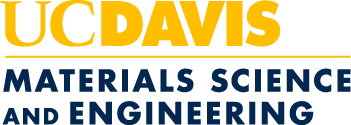Applications for priority review are due January 15, 2026.
Read the full list of degree requirements for more information.
Expand Your Knowledge and Gain Research Experience
About the M.S. Degree
The Master of Science (M.S.) degree is aimed at preparing students for careers in research and development, or for further study in the field. Like the doctoral degree, the M.S. degree combines coursework and research, but with a more limited scope of the research project and thesis to reflect the shorter time-to-degree. After graduation, the majority of our master’s students find jobs in industry. Check out our "After UC Davis" page for examples of where some of our graduates have found employment.
Degree Requirements
You will begin with the core courses for the degree and our "Preparing for Graduate Student Success" course (EMS 200), which will match you with a major professor over the course of your first fall quarter. The six core courses are listed below:
- EMS 260: Advanced Thermodynamics of Solids
- EMS 262: Advanced Topics in Structure of Materials
- EMS 264: Transport Phenomena in Materials Processes
- EMS 268: Advanced Materials Characterization
- EMS 272: Advanced Functional Properties of Materials
- EMS 274: Advanced Mechanical Properties of Materials
For electives, you can select from any available upper-division undergraduate course (courses numbered 100-199) or graduate-level course (courses numbered 200-299). Popular electives include those from physics, chemistry, computer science, management and other engineering disciplines. In consultation with your major professor, you will select courses each quarter based on your career goals and aspirations.
Students are also expected to complete two quarters of EMS 290: "Department Seminar," which requires students to attend a majority of the weekly departmental lectures by visiting scholars in the field. This course exposes graduate students to the latest advances in materials science and engineering.
Sample schedule (full-time student)
| Fall (Year 1) | Winter | Spring | |||
|---|---|---|---|---|---|
| EMS 260 | 4 | EMS 272 | 4 | EMS 268 (Fall 2020 or later) | 4 |
| EMS 262 | 4 | EMS 274 | 4 | Elective (1XX/2XX) | 3 |
| EMS 264 | 4 | Elective (1XX/2XX) | 3 | EMS 299: Research | 6 |
| EMS 200 | 1 | EMS 290 | 1 | ||
| EMS 290 | 1 |
| Fall (Year 2) | Winter | Spring | |||
|---|---|---|---|---|---|
| EMS 299 | 12 | EMS 299 | 12 | EMS 299 | 12 |
| Advance to Candidacy | File Thesis | ||||
| Graduate |
A program of study form is available to help with planning the course schedule.
Thesis
The master's thesis is a scholarly piece of computational, experimental or theoretical research that is rigorous in approach in terms of design, methodology and analysis. Students advancing to candidacy should prepare an outline of their thesis, which should include a critical evaluation of the methods and limitations of the research project and a full description of the experimental design, protocols and data analysis. There are no limitations on the length or the number of publications required.
Read the full degree requirements (beginning Fall 2020) for more information.
To learn more about transferring coursework, please go to Graduate Studies webpage on the topic.
For students who matriculated in Fall 2019 or prior, please see the previous degree requirements for more information.
Frequently Asked Questions
- How will I pay for my master’s degree?
- Though there is no guarantee of departmental funding or fellowships for master’s students, students who want to serve as teaching assistants or readers should apply for positions both within and outside of the department.
At UC Davis, teaching assistants and readers hired for at least 25 percent time (10 hours per week) receive a salary and fee remission. Fee remission, which covers almost all of the in-state fees and health insurance costs, from employment as a teaching assistant (TA) or reader, either within or outside of the department in fields such as chemistry, math or other engineering disciplines. If you have filed a FAFSA, you may be eligible for further aid through the Office of Financial Aid. For more information, check out "Funding Your Degree."
- How likely is it that I will obtain a teaching assistant or reader position?
- It would depend on the availability of teaching assistant and reader positions within the department and other campus departments. Some students were also employed in other departments, such as Chemical Engineering, Chemistry and Math. The Graduate Studies employment webpage also offers a full listing of jobs available to graduate students.
- How is the Master of Science (M.S.) degree track different from the Master of Engineering (M.Eng.) degree track?
- Though the two degree tracks have a lot of overlap, there are a few key differences. The M.S. degree tends to be more research-based, culminates in filing a thesis with the Office of Graduate Studies and typically takes two years to complete. The M.Eng. degree is more coursework-based, culminates in a capstone project and can be completed in one year.

